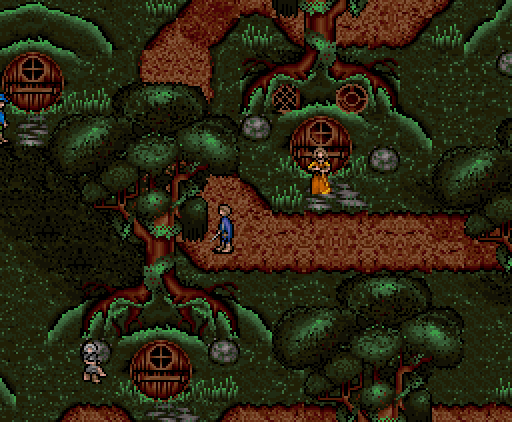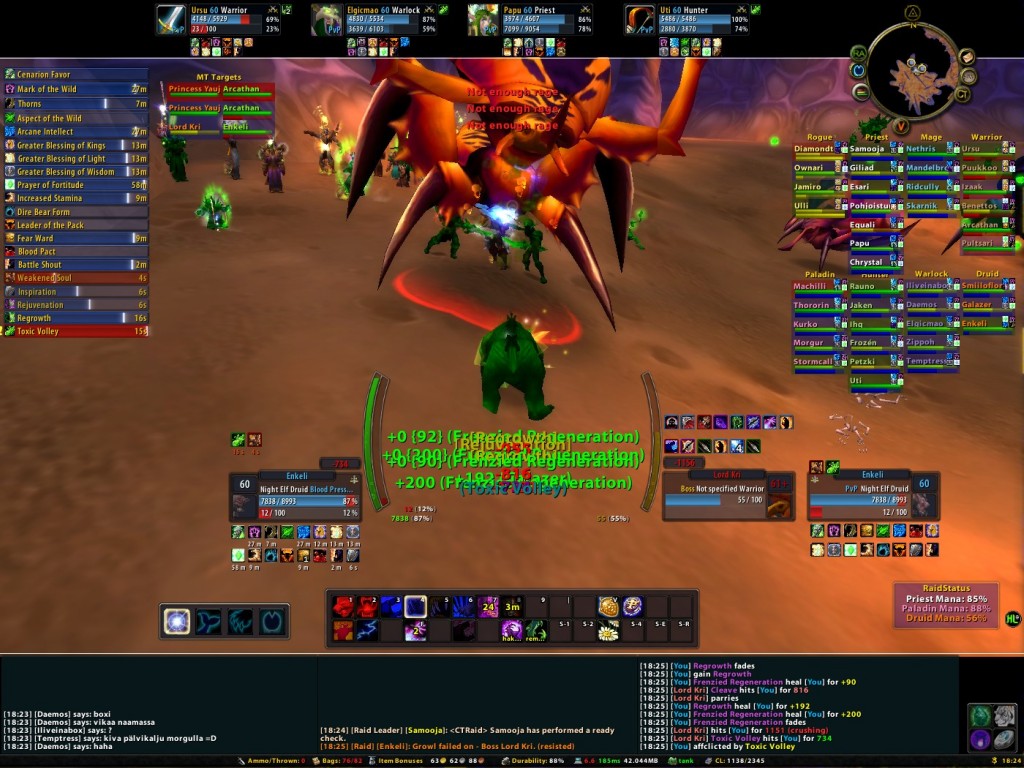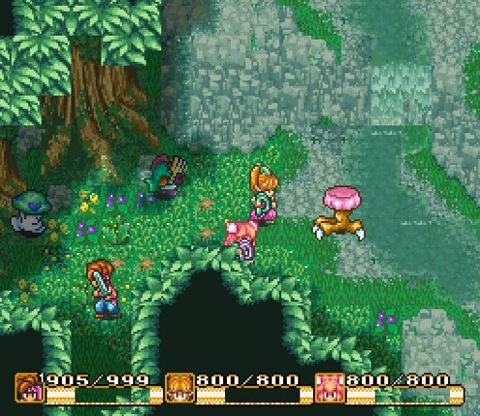Last updated on October 29, 2013
First, a comparison should make it blatantly apparent. How many cooperative role-playing games existed in the early 1990s? I can’t think of many that were any good. The old Lord of the Rings SNES game, similar though it was, remains one of the worst games ever made, with dungeons and maps that simply sprawled without any identifying markers as to where you were or what you were supposed to do to progress. Combat boiled down to button mashing and trying your hardest to avoid damage, but those wolves at the beginning were absolute monsters who would probably kill Samwise Gamgee before you’ve even left the Shire. There were no interesting abilities, no strategies, and much of your success rested on blind, dumb luck, or some kind of natural aptitude for photographic memory or a profession as a real life cartographer. I’m not kidding on that one: the official guide doesn’t even have full maps! Even when strategy guides were helpful, Prima couldn’t figure out how to map the game – that’s an accomplishment, to say the least! It should be pretty obvious that the game had no map system, either. Furthermore, your characters, once they died, were dead permanently, and any mistake could send you back to the beginning of the game. It tested your patience and ability to endure self-induced pain more than it did your brain.
It’s difficult to convey how much I hate Lord of the Rings. It uses all the same tropes and ideas as Mana, yet the execution leaves so much to be desired that you’re better off desiring something else. Perhaps I’m just weaned on Japanese games and LOTR was supposed to exist in the vein of PC dungeon crawlers, but even then an open world isn’t supposed to look like a dungeon, is it? LOTR was based upon the book license, so it may have explained my reticence to read the books (which, surprise, continues to this day, even if I love the Peter Jackson trilogy). Thus, there are ways to get this idea right, and to get it wrong. As a coop experience, Lord of the Rings was incredibly frustrating because it didn’t require skill at all, and didn’t give the player any interesting tools. Hence, everyone plays the same – and that’s exactly what no person on earth is like. I remember playing with my companions and just being completely frustrated at the whole game. It was, to put it bluntly, a major dissapointment because it wasn’t like SoM at all. Secret of Mana may not have the vast Tolkein mythos to utilize in the creation of its world, but it remains vivid and alive in my personal world, rather than whatever stodgy English countryside the horrific looking Shire up above was supposed to represent.
If you’ve got a group of people playing and we’re all complaining about being totally lost, what fun are you having? Coop games can’t just throw you into the same experience as a single player game. Is LOTR a good single player experience? Well, it’s much more interesting than playing with friends, that’s for sure! Each character doesn’t have unique abilities, but the task of micromanaging each person in your fellowship (har har) appears the goal of the game. Even if it fails as a coop game, it’s at least competent (if extremely unforgiving) as a single player game. Thus, I find it particularly egregious that they bothered to give the game multi-player support at all – that’s a sign that the developer doesn’t actually know what his/her product actually does, and has to compensate by adding new, useless features that may destroy the experience for some people (points to self).
If LOTR, then, was a failure at this formula, SoM succeeds at presenting a fully formulated, entertaining coop experience. It’s people that make the game interesting, and different roles attached to those people as described previously. Like, for example, like World of WarCraft, Mana almost forces you to play with others, and play with them well. No member of the team is really an afterthought, as they all maintain their use; hence, no person playing with you ever feels left out or completely useless in a fight. Every character can equip every weapon, so it’s worth your while to try mechanics out and experiment. Do I use the pole dart, or do I switch to the gloves? What weapon should I level? Should I build up Gnome or Sylph? Any of these choices require a time investment from all involved, so it’s not an innocuous choice. Grinding isn’t so much a requirement as it’s something you’ll perform precisely to test and level weapons and magic, and everyone in your party wants to try stuff out. You should, if playing it right, actually talk to the people sitting next to you – lo and behold, you might actually be having a good time talking casually while playing! There’s moments of mindless killing, yes, but there’s also moments of intense gaming where all three of you are glued to the screen and strategizing the timing for casting sword buffs, or offensive magic, or noting how many Fairy Walnuts you have left. That pacing, then, is essential to the experience.
World of WarCraft reminds me of this in odd, subtle ways. You’ll spend a lot of time in the main city, exacerbated now with Dungeon Finder being so efficient and all, and in that time you are doing stuff. You might be crafting a new item, making money, talking to a friend, questing, etc. Still, when the Dungeon Finder finally lines the player with some companions, it’s game time, whether in PvP or PvE. In that sense, WoW has a great many moments of relaxed questing, crafting, socializing, doing all those at once, or whatever other therapeutic motion comes to mind, punctuated by sections of intense and focused video game action. There’s the casual social element that many people don’t understand from the outside in a MMO game. But, this social element existed long beforehand, starting in arcades with competitive play, up until the Japanese obsession with PSPs and Monster Hunter. A lot of game, though, aren’t designed for the cooperative experience, and many times it can easily be shoehorned for some additional points to your MetaCritic aggregate (or not, in the case of LOTR).
It is these cooperative elements that make up for most of the other flaws of the game, and that is truly remarkable.Secret of Mana presents a pretty standard high fantasy world in the vein of a storybook. You can see the influence in Legend of Mana, which took the idea into its full flowering, but here is the start of that trend. Everything’s in bright colors, and those things that aren’t are supposed to be evil and bad! Hurray for simplistic tales of good and evil! I can’t imagine anyone playing this for the story. It’s not really worth anyone’s while to regale the specifics of the plot, and why I should care that Mana is being drained from the world, or the specifics of Mana Tree metaphysics, or why the Mana Beast is a force of nature that needs to be stopped. Frankly, this is why later entries in the series strike me as insufficiently respectful of their source material – the game doesn’t really care about the narrative so much except as a vehicle to drive the player from point A to point B, and interesting locale/fight X. The horrendous localization only adds to this notion – sometimes, characters have trouble telling you where to go next, and in a game that doesn’t hold your hand very much, it’s up to the player to take a good, educated guess as to what sequence of events needs to be performed in order to reach the next destination.
Yet, all of these horrible errors don’t dilute the experience, not one bit. It’s because you play with unique people, other persons who have entirely different tastes and approaches, that make SoM an absolute pleasure to play. It’s almost embarrassing that no game I have played yet with cooperate play has managed to usurp its position (with the exception of World of Warcraft, I’d bet). In fact, playing the game represents a model of human community, the Church. In 1 Corinthians 12, Paul states:
4 Now there are varieties of gifts, but the same Spirit. 5 And there are varieties of ministries, and the same Lord.6 There are varieties of effects, but the same God who works all things in all persons. 7 But to each one is given the manifestation of the Spirit for the common good. 8 For to one is given the word of wisdom through the Spirit, and to another the word of knowledge according to the same Spirit; 9 to another faith by the same Spirit, and to anothergifts of healing by the one Spirit, 10 and to another the effecting of miracles, and to another prophecy, and to another the distinguishing of spirits, to another various kinds of tongues, and to another the interpretation of tongues. 11 But one and the same Spirit works all these things, distributing to each one individually just as He wills.
Each person, in that sense, gains their own unique job and role in the Church. Each, by God, is granted a specific spiritual gift, and that gift isn’t universal among a congregation of people believing the exact same thing. The Holy Spirit, then, equally distributes gifts, but not the same gifts. This is an important distinction for Paul to reveal: God deals with each person as a unique entity in themselves, yet part of a greater whole (if this sounds like trinitarian theology, you’d be right). A team of three has three individuals; none of them could be exactly the same, or they dilute the effectiveness of the whole. Three people who think exactly the same on everything couldn’t possibly see a situation from every angle. Furthermore:
12 For even as the body is one and yet has many members, and all the members of the body, though they are many, are one body, so also is Christ. 13 For by one Spirit we were all baptized into one body, whether Jews or Greeks, whether slaves or free, and we were all made to drink of one Spirit.
14 For the body is not one member, but many. 15 If the foot says, “Because I am not a hand, I am not a part of the body,” it is not for this reason any the less a part of the body. 16 And if the ear says, “Because I am not an eye, I am not a part of the body,” it is not for this reason any the less a part of the body. 17 If the whole body were an eye, where would the hearing be? If the whole were hearing, where would the sense of smell be? 18 But now God has placed the members, each one of them, in the body, just as He desired. 19 If they were all one member, where would the body be? 20 But now there are many members, but one body. 21 And the eye cannot say to the hand, “I have no need of you”; or again the head to the feet, “I have no need of you.” 22 On the contrary, it is much truer that the members of the body which seem to be weaker are necessary; 23 and those members of the body which we deem less honorable,on these we bestow more abundant honor, and our less presentable members become much more presentable,24 whereas our more presentable members have no need of it. But God has so composed the body, giving more abundant honor to that member which lacked, 25 so that there may be no division in the body, but that the members may have the same care for one another. 26 And if one member suffers, all the members suffer with it; if one member is honored, all the members rejoice with it.
A body can’t work if its component parts don’t work together. If my heart decides it wants to take the role of the brain, we’re going to have a problem! This metaphor works so brilliantly because the Body of Christ means each member, each Christians, becomes a single thread in a greater tapestry (another good metaphor). But even if you’d say “the heart keep me alive, not the eyes”, that doesn’t dismiss the importance of the other sections. Each has its role; I may not like the fact that all I get to do in the game is melee attacks like the Hero, but I understand the other two party members pick up the slack in long ranged fights and distributing buffs; a warrior can’t live without a healer by his side, after all. It’s a team effort, and you can’t suddenly renege on your role; if you do, you bring the whole body down with you. Division, in a cooperative sense, leads to defeat; that doesn’t mean there’s no room for debate, or discussing strategies, but Christians (and heroes) need a unified front to confront trials and tribulations; otherwise, they can never succeed. Thus:
27 Now you are Christ’s body, and individually members of it. 28 And God has appointed in the church, first apostles, second prophets, third teachers, then miracles, then gifts of healings, helps, administrations, various kinds of tongues. 29 All are not apostles, are they? All are not prophets, are they? All are not teachers, are they? All are notworkers of miracles, are they? 30 All do not have gifts of healings, do they? All do not speak with tongues, do they? All do not interpret, do they?
Each individual, however quirky and odd, has their own role to play. We should all desire the greater gifts – that is, the ones for which we were designed, but each has their own role to play. Discovering that role alternates between taxing and fun, but it all exists as part of a greater process.
So much for that bit of context. Whereas most people learned teamwork and the like through sports and “activities”, so to speak, mine occurred incredibly early through video games. When you’re a kid, you may be a bit too young to do anything of importance; at that point, you’re still learning how exactly the world you were born into works. There’s rules you must learn, social skills that need to be developed, and an education to be fostered (by parents, hopefully). I was raised as a Christian from four years old, about 80% of my waking life at this point, so I was learning about the Church at the same time as Secret of Mana became a minor obsession. Mana became a tool, unintentionally, for discovering the roles of individuals within a group, and Christians within a Church. We didn’t have player’s guide, or GameFaqs, or the Internet; all we had was each other, and that’s all we needed. Granted, it was a tough road; I was still learning how to play video games, so the basic concepts of how games work were ingrained in me. If I didn’t, how could we finish the game? That 120+ hour clock didn’t raise itself! That was hard work, perseverance, and learning – except it was done between multiple people understanding, sharing, and discovering a huge world.
I suppose that’s why, eighteen years later, a playthrough with my brother and father once again remained just as riveting, exciting, and fun as in the past. We may have changed as people, surely, but each of us fulfill our roles, and perhaps try out new ones. I ended up as the Girl, my brother as the Sprite, and my father as the Hero; it changes the experience a great deal when one has to adjust to a new role. Still, all it takes is time and effort to make it through once again, to learn your role, your gifts, and using them to greatest effectiveness in the game. As it is in a game, so it is in real life, and I’ve never forgotten those lessons. And, perhaps, the stupid giant bird feet in the Pure Lands that destroy you in two hits. God, those things required some strategy.
So, I ask: why can’t a video game teach you about life, especially Christian life?



